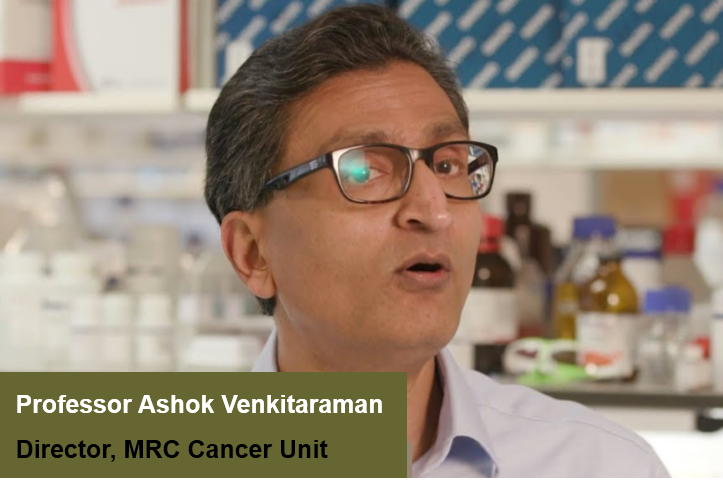The year 2017 came to a close with the Basser Center for BRCA naming Prof. Ashok Venkitaraman [Ursula Zoellner Professor of Cancer Research; Director, Medical Research Council (MRC) Cancer Unit, Cambridge] the recipient of its fifth annual Basser Global Prize. Prof. Venkitaraman is the Collaborative Science Chair at inStem and NCBS, and also coordinates the Centre for Chemical Biology and Therapeutics (CCBT).
The Basser Global Prize was established by Shari Basser Potter and Leonard Potter to honour a visionary scientist who has conceptually advanced research on inherited breast cancer genes that has led to improvements in clinical care. Previous awardees include Dr. David Livingston (Harvard University) and Dr. Mary-Claire King (University of Washington).
Ashok’s research has contributed fundamentally to the current understanding of how cancer is suppressed by genes that maintain the integrity of human DNA. His laboratory first discovered that faults (‘mutations’) in the breast cancer gene, BRCA2, provoke chromosomal instability leading to carcinogenesis, and is now widely recognized for uncovering how BRCA2 and related human genes act as ‘chromosome custodians’. His work helps to explain why individuals who inherit mutations affecting such genes are predisposed to cancer. It has provided scientific foundations for new therapies now being used in the clinic, by illuminating fundamental mechanisms that control the repair, duplication and segregation of chromosomes in dividing cells.
The work in Ashok’s laboratory has been driven by the longstanding clinical observation that only about 5-10% of pre-invasive early malignancies progress to invasive cancer. To understand the biological mechanisms that prevent cancer progression, Ashok’s group has studied monogenic disorders (which are the result of a single defective gene) that predispose humans to cancer, based on the idea that the genes mutated in such disorders must play important roles in cancer suppression. This research has led Ashok to discover new biological mechanisms that prevent malignancy, and also more recently, to using this knowledge to devise new strategies for early interventions in cancer patients to detect, risk stratify and potentially cure the disease.
For example, Ashok’s lab discovered a few years ago that BRCA2 does not conform to the Knudson two-hit paradigm for tumour suppression, in that mutations affecting just a single BRCA2 gene copy (mono-allelic mutations) sufficed to promote human carcinogenesis. He has since systematically discovered new mechanisms that help to explain how mono-allelic BRCA2 mutations cause cancer. Ashok’s lab showed recently that an important group of mis-sense mutations in BRCA2 (accounting for ~30% of inherited mutations) cause a “dominant negative” effect even in the mono-allelic state by disrupting a pathway responsible for the transport of BRCA2 to its site of action in the cell nucleus. Last year, Ashok discovered that several BRCA2 truncating mutations (accounting for ~70% of inherited mutations) cause an unusual sensitivity of cells to the genotoxic effects of a pervasive class of environmental and endogenous chemicals – the aldehydes – via a novel protein-degrading mechanism.
More recently, Ashok along with his colleagues in Bangalore’s Center for Chemical Biology & Therapeutics (CCBT) has sought to exploit new knowledge of this kind to devise new approaches for cancer treatment. Work at the CCBT has explored the idea that intracellular signalling via enzymes like protein kinases may be selectively inhibited using new drugs that prevent the recognition of phosphorylated proteins – leading to their recent discovery of Bractoppin, the first drug-like inhibitor to selectively modulate signalling via the BRCT family of phosphopeptide-recognizing protein domains.
When interviewed, Ashok noted, “The Basser Global Prize recognizes the hard work of many past and current members of my laboratory. I am pleased that these achievements may soon help families carrying inherited cancer-predisposing genetic mutations.” The award presentation will be accompanied by Ashok’s keynote address to the annual Scientific Symposium held at the Basser Center for BRCA on Tuesday May 22, 2018.
The Bangalore Life Sciences Cluster wishes Prof. Venkitaraman greater success in his endeavours in cancer research, now and in the future.










0 Comments